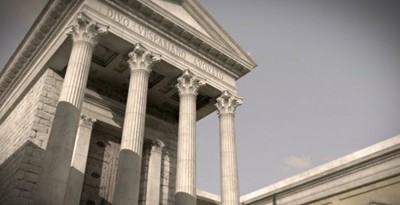
To see the previous installments, click on the following links: #1, #2 , #3, #4, #5, #6, #7, #8, #9, #10, #11, #12, #13, #14, #15, #16, #17, #18, #19, #20, #21, #22
In those dark days when the fate of Marcus's son hung in the balance, his father's figure rose up for what he was, a legionary against the implacable system of Rome. Aware that every second his son spent in the dank and gloomy Carcer Mamertina was another step towards the destruction of his spirit, Marcus used every trick and resource at his disposal to free him from that deadly prison.
I saw him send messages as fast as slaves's feet could carry them, run from office to office and gather his most loyal and important clients; among them, Aulus Umbricius Scaurus, his partner in the garum business. Everything was little enough to win the favours of those influential senators, magistrates and protectors of his family, with whom he shared past benefits and promises of future favours.
Marcus, in his resolution, spared neither sesterces nor pledges of honour. He knew well that his son, regardless of the appearance of guilt or innocence, could not long endure the burden of that prison. To those nobles of Rome, the spiritual strength and dignity of a man of their gens seemed secondary to the gravity of what some still called crime. But Marcus saw in all this more than a question of guilt or innocence; it was the survival of his Celtic lineage, the preservation of his honour, that was at stake.
So he not only deployed the arsenal of his wealth, but appealed to the network of his clients, reminded them of their duty of fidelity, promising them not only earthly but also eternal rewards. There was talk of how he promised to erect a temple to Vespasian's divinity in Pompeii itself, as a symbol of devotion and gratitude. I imagined, as I heard it, that majestic structure, with marble columns and gilded statues, erected in honour of the emperor. And I knew that for Vespasian, whose ambition rivalled in height the Capitoline Mount itself, such a promise would be no trivial matter.
It was a relentless battle, where Marcus relentlessly resorted to every resource, buying wills, bribing and exerting his influence. And the future emperor Titus, who in those days was benevolent towards Marcus's cause, represented the best hope.
Perhaps, in the end, it was not justice that would be victorious, but an intricate web of favours and loyalties, of expediencies and promises of future temples.
To be continued
Header Image:
Temple of Vespasian (Pompeii). Author: Roman Italica (Eduardo Barragán)
Could it be that when the volcano in Pompeii erupted, Marcus's son, who was in a Roman prison, was the only one who survived? Anyway, I'm glad that you are fine. I heard some news about floods in Spain. Stay safe.
Here you mentioned the "Celtic heritage" of Marcus in this passage. That might need to be mentioned several earlier in the story. Also, wasn't Pompeii and ancient Etruscan colony? People probably spoke Latin with a heavy Etruscan accent. Did Etruscans and Celts have much contact with each other?
The end is not far away, Yumi ( @yumiyumayume ). This story has 30 episodes. It is true that human justice will not come to Marcus's son but a death cannot go unpunished...I am a classic storyteller...cosmic justice, to say the least, will come. It is true that the eruption of Vesuvius and the plaster casts will be the climax of the story...There is little left...To be continued....
I didn't know what to tell about Marcus's origin because I didn't want to break the rhythm of the narrative. The story didn't have to be very long. Even so, I imagine that Marcus comes as a slave from Britannia, where a long war was fought against the Brigantes (Βρίγαντες), a Celtic people settled in the present-day county of York.
On the Etruscan origin of the city, Tim ( @T-Newfields ), the information I have is that since the 8th century BC there had been Greek colonies in the region, most notably the important city of Cumae, across the Gulf of Naples.
In the account I give, the population has a strong Greek influence.
Yes, I am fine. These atmospheric phenomena of torrential rains occur in the eastern part of the country. Here they are called "gota fría" and also "dana". They usually occur in the autumn season and are devastating. Climate change and the deforestation of nearby mountains that has occurred throughout history facilitate very rapid floods that do not give people and the security systems of public administrations time to react. Thank you so much, Yumi ( @yumiyumayume )
Thank you very much for your corrections , Uly ( @CocoPop )
You're very welcome. I'm glad you're safe!